- Home
- Darren Shan
Archibald Lox and the Bridge Between Worlds
Archibald Lox and the Bridge Between Worlds Read online
ARCHIBALD LOX
and
THE BRIDGE BETWEEN WORLDS
BY
DARREN SHAN
Archibald Lox, Volume One, Book One of Three
Table of Contents
Title Page
Archibald Lox and the Bridge Between Worlds
ONE — THE BRIDGE
1
2
TWO — THE VINE
3
4
5
THREE — THE BUFFER
6
7
FOUR — THE PRISONER
8
9
10
FIVE — THE DEAD
11
12
SIX — THE RIVER
13
14
15
16
17
SEVEN — THE KING
18
19
20
21
22
23
EIGHT — THE BOY
24
25
also by Darren Shan
copyright page
“There is no foreign land; it is the traveller only that is foreign.”
— Robert Louis Stevenson
ONE — THE BRIDGE
1
A sickening silence reigns in the house of death. George and Rachel are sitting at the kitchen table, numbly picking at their breakfast. They look blank, lost, more like puppets than people. All these months later, they’re still not even close to getting over what happened.
I’m standing in a corner, wearing my school uniform. If my foster parents notice me, they say nothing. We find it hard to say anything to one another these days. I can’t remember the last time one of them spoke to me directly.
I glance at the clock. It’s time to leave. I think about saying goodbye, but I can’t bring myself to break the crushing silence, so I slip out, taking my blazer from where it hangs near the front door. There’s a photo of Dave on the wall, in his uniform, smiling.
I’ve opened the door, but I’m still staring at the photo, remembering the day that everything ended and the nightmare began. Dave’s trapped in photos, video clips and memories now. He’ll never grow older or rock this house with his laughter again. Lost to the silence forever.
I step out and close the door oh-so softly behind me.
It’s a grey, heavy day in London, lifeless clouds hanging in the sky as if stuck there with glue, and I know even before I hit the pavement that I won’t be going to school. There’s a tight knot in my stomach, and the thought of sitting in class makes me want to throw up. It won’t be the first day I’ve skipped since the accident. Nobody has said anything about the absences. Sometimes I feel like nobody in the entire world will ever say anything to me again.
I gaze at people in coffee shops as I trudge past, wondering if any of them has lost someone the way we lost Dave, if this city of millions feels as cold and alien to them as it does to me.
I wind up on a bridge over the Thames. There’s a railway line up the centre, a footbridge on either side of it. I walk across one of the footbridges, studying the river, thinking about Dave, the accident, how easy it would have been to save him if I’d seen the danger in advance.
“There’s a dangerous drop on the other side of that wall, Dave. Hop back onto the path.”
That’s all it would have taken. He’d have rolled his eyes and asked me if I thought I was his minder. Then we’d have laughed and carried on, and the day would have been like any other, and he’d still be here.
Leaving the bridge, I drift along the riverbank. For a while I blamed the Thames for stealing Dave from us, but I came to see how silly that was. It was an accident. Not Dave’s fault. Not mine. Certainly not a river’s.
I return to the footbridge, walk about three-quarters of the way along, then stop and study the view, which takes in the London Eye and the Houses of Parliament, glass skyscrapers in the distance.
I should be cheerful, with no school and that view, but I can’t stop thinking about Dave. I feel lost and alone, with nothing to do and all the time in the world on my hands.
Hoping to distract myself, I focus on the people crossing the bridge. Many are tourists, pausing to take selfies, smiling and laughing, flashing the peace sign or pretending to prop up the London Eye. A few joggers pant past. Men and women in business suits march by, talking loudly on their phones. Foreign students on school trips. A few pensioners.
And then I spot the girl.
She’s my sort of age, darker skinned than me, maybe Italian or Spanish. She has black hair cut short, and wide brown eyes, dressed in plain cream trousers and a red, long-sleeved top. Her boots are navy, scuffed and stained with dry mud.
She comes running along the bridge in a panic, stops near where I’m standing and starts grimacing bizarrely. Her nose twitches, her lips gurn, her eyebrows shoot up and down, her tongue flickers out and around.
At first I think she’s pulling faces at me and I open my mouth to snap at her, but then she throws a worried – no, terrified – glance backwards, and I realise she hasn’t even noticed me.
Two men are striding towards us. They’re dressed in white suits, white shoes and white ties. One is black, the other pale like me. Both are bald, except for a curved, thin strip of white hair that arcs across their foreheads, the tips of the crescents pointing towards the backs of their heads.
The pale man is holding a long, narrow knife, the sort they called a stiletto in the old days. The darker man is carrying an axe, swinging it through the air in short, menacing strokes.
It’s clear that the men are chasing the girl and will kill her if they catch her.
The girl gulps, then pulls more faces. She’s staring at the paving slabs. I want to cry out and warn her of the danger, but she’s obviously aware of the threat. I can’t understand why she isn’t fleeing, why she’s drawn to a halt and is wasting precious time pulling those ridiculous faces.
I think about intervening – I could tug the girl away from the onrushing men and help her escape – but I’m rigid with fear, breathing shallowly, eyes wide, shocked by what’s happening.
When the men are several metres away, a couple of slabs in the bridge shimmer and a hole yawns open. I think it’s a trick of the light, so I do a double take, but it’s definitely a hole, a gap where a moment before there had been solid stone.
With a victorious yelp, the girl throws herself into the hole. The men’s faces twist with rage and they pick up speed, but the girl yells something, and in an instant the slabs are back in place.
The hole is gone.
The bridge is solid again.
The girl has disappeared.
The armed, angry, white-suited men stand there, scowling at the spot where she vanished. I look to see how the other people on the bridge are reacting to this, but to my astonishment they angle round the men, paying them no interest, not even sneaking a quick look at their weapons.
Then, as I gawp at the slabs and the men, the pale guy with the stiletto raises his head and looks straight at me.
“I think the boy can see us,” he says.
The man with the axe looks around uncertainly. “What boy?”
“That one,” knife-man says, pointing at me with the blade.
Axe-man stares at me. “Are you sure? He’s wearing Born clothes.”
“They could be a disguise,” knife-man says.
A lump of terror forms in my throat. The men are studying me as if I’m an insect, and there’s no doubt in my mind that they can stamp me out as swiftly as a bug if they choose.
But even while firew
orks of fear explode inside my head and I stand on the verge of a meltdown, I’m noting details of what’s going on around me. It’s like part of my brain has detached itself and is working hard to save me.
“The other people don’t see them,” a voice whispers inside me. “They don’t know that the two men are here. They didn’t see the girl or the hole either.”
I don’t know how that can be true, but I instinctively know that it is.
Prompted by the voice, I cast my gaze around, as if I’m still people-watching, and clock the movements of pedestrians as they approach the two men. Without seeing the pair in the white suits, they sense something in their way and move to bypass the obstruction.
“He does look a bit shifty,” axe-man says and his face hardens. “Will I chop off his head, just to be safe?”
I act as if I haven’t heard, and hope the blood isn’t draining from my cheeks. I’ve managed to hold myself together but my knees are threatening to spasm. I need to convince the men that I’m unaware of their presence.
Remembering something that I’d seen earlier, I cock my head and focus. “What on Earth...?” I murmur, and step towards the men in the suits.
They squint at me as I approach. I try to behave like the other people, and angle my body in order to slip between them. I feel (or imagine) a cold wind skittering across the back of my neck as I pass.
I stop at the rails and stare across the gap that separates the footbridge from the railway line. A small tree is growing out of one of the supports, in a circle of unbroken concrete. Dirt must have built up in a crack, and a seed must have got lodged and taken root, but I pretend to be flabbergasted.
“How did that get there?” I mutter, like a botanist who has found an Amazonian tree in the middle of the Sahara. I’m laying things on thick but the men buy it.
“You were wrong,” axe-man says. “He was just looking at that tree.”
“So it seems,” knife-man sighs. “A pity. I was looking forward to killing the girl. He would have been compensation.”
“We could kill him anyway,” axe-man says helpfully.
My insides turn to ice, and I’m glad the men can no longer see my face, as I’m sure my stricken expression would betray me.
I sense the man with the knife deciding whether or not to attack. I want to run, but they’ll catch and slaughter me if I do.
“No,” he finally sniffs. “We’d break cover if we killed a Born. People would see us.”
“It wouldn’t be the first time,” the other man laughs.
“I know, but it would be foolish to draw attention to ourselves when there’s no need. Besides, we’d be wasting time. The camel has given us the slip but she can’t be far ahead of us. We should start scouting for her trail.”
“You are right as always, Orlan,” axe-man says. Then I feel him lean in close to me, and the warmth of his breath on the back of my right ear as he whispers, “You don’t know how lucky you are, little boy.”
With that, the pair set off. I take a step back from the rails, as if still studying the tree and wondering how it sprouted in the middle of a concrete pillar. I chance a glance left. The men haven’t looked back. Moments later they reach the stairs and start down. As soon as their heads are no longer in sight, I slump against the rails and cling on for dear life as my legs turn to jelly and tears roll down my cheeks in unchecked waves of terror and relief.
2
I’d like to cling to the rails for hours, sobbing and shivering, but people must be staring at me. It’s only a matter of time before somebody stops and asks if I’m OK, and I’ll be in trouble if I answer truthfully. I can’t tell anyone what I’ve seen — I’d sound like a maniac.
I stay facing the scrawny tree, scrunch up my eyes until the tears stop, and wipe my cheeks dry. My heart gradually slows to a more regular thumping rhythm. My breath starts to come easily. My fingers stop shaking.
I make sure the men in the white suits haven’t come back, then set my sights on the slabs in the bridge. They look like ordinary paving stones, a few thin cracks running through them, stains from old bird droppings. If I walked to the far end of the bridge, then retraced my steps, I wouldn’t be able to locate them again, since there’s nothing remarkable about them.
But I have no intention of leaving until I make sense of what I saw.
Now that fear has drained from me, fascination fills its place. A girl caused a hole to appear in the stone floor of a bridge, then slipped into it and sealed it shut behind her. That sort of thing doesn’t happen every day. It shouldn’t happen any day. I’ve witnessed something impossible.
And I want to know more.
Stepping away from the rails, I crouch beside the slabs and run a finger round the joins. I rap on the stone with my knuckles, then pound it with my fists. Nothing gives, so I stand and hammer it with the heels of my shoes, to no avail.
As I’m hammering the slabs, I pause to wonder what the people passing by are thinking. I look up, but nobody is paying me any attention. They’re veering around me, the way they veered around the two men. Whatever’s going on, it seems I became part of it when I stepped onto these slabs.
Remembering the faces the girl pulled, I twitch my own features, pushing my lips out, then stretching them, widening and narrowing my eyes, wrinkling my nose. For a long time nothing happens, and I start to wonder if I imagined the whole incident. But then...
The slabs shimmer.
The surface turns partly translucent and I spy something through it. At first I’m not sure what I’m looking at, but as I continue to pull faces, the colour of the slabs fades another few shades, bringing the objects beneath into sharper focus.
Locks.
I stop pulling faces. The surface doesn’t change back, and the locks remain in sight. There are five of them, wide keyhole locks, varying in size and appearance. Two of the locks are a dark golden colour, two are silver, and one is a fleshy pink. No sign of any keys, but something (the same something that told me the people on the bridge couldn’t see the would-be killers) tells me that keys aren’t required. The holes are bigger than on normal locks, big enough to slide your fingers into, and I have a feeling that these can be locked or unlocked by touch alone.
I stretch out a hand towards a golden lock, sure I’ll meet resistance from the slab, but to my astonishment my fingers pass through the surface of the shimmering stone as if it’s made of water.
I yank back my hand with a yelp and flex my fingers, making sure they’re all intact. When I don’t spot any damage, I extend my hand again, but slowly this time. As before, my fingers pass through the upper layer of stone. There’s a slight dip in temperature but no other difference.
Having held my hand steady for several seconds, I reach in further, sliding my fingers into the hole of the large lock, as if they were a fleshy key. I feel bits of metal inside. Some of the pieces move and make a soft tinkling noise as I slide my fingers around.
As strange as all this is, the strangest thing is how normal it feels. It’s as if I’ve done this thousands of times before. A warm smile spreads across my lips, the sort of smile that comes when I eat a favourite food that I haven’t had in a long time.
Without thinking, I move my fingers, exploring the workings of the lock. Closing my eyes, I begin to put together a mental image of the interior. There’s no way I can know what a lock looks like inside, or how to manipulate it, yet I’m convinced that I do. The voice that had earlier told me how to act in the presence of the killers now speaks again, saying, “Move this bit that way,” and, “Slide that piece across.”
Moments later, as my fingers push, tweak and glide, there’s a sweet clicking noise and all of the bits slide back into the shell of the lock.
It’s open.
As excitement bubbles up, I move my hand to the other gold lock and slide my left hand into one of the silver ones at the same time. It’s difficult working on two locks at once, yet I rise to the challenge with the minimum of effort. It takes a few minu
tes, but in the end both locks click open.
That leaves the second silver lock and the pink one. These are smaller and more intricate. I can’t slide in my hands or work on two of them at the same time, so I focus on the silver lock first and poke the tip of a finger into it, probing slowly, using a fingernail to carefully pick at the tumblers.
In the end the lock clicks (a very soft sound, almost imperceptible) and I’m able to turn my attention to the final lock.
I expect this one to be the most challenging, but I’ve learnt a lot from the others, and it yields to my charms within seconds. Almost before I know it, there’s another soft click, then...
The hole appears.
It’s as sudden as when the girl summoned it, and still mind-boggling. I don’t yelp or flinch, but I fall perfectly still, not moving, not breathing, just staring.
It’s green inside the hole. There’s some sort of a tunnel, though I can’t see much of it from here.
After a long, awed pause, I start to stick my head into the hole.
No.
I stop.
The girl jumped in. It probably doesn’t matter if you go head or feet first, but I’d be a fool to take chances. Hell, I’d be a fool to do anything. I should turn my back on this and hurry away. I’ve uncovered something incredible, and there can be no return to the normal world if I descend into the impossible tunnel that I’ve revealed.
But that’s the thing. I revealed it. Nobody else on the bridge saw the girl, the men with the weapons, the hole. They don’t see me either now. I’m different. If I fled, I could pretend it never happened, convince myself that I dreamt the whole thing, carry on with life as before. Except...
I’d know. Deep in my heart, I’d know, and I’d always hate myself for accepting the limits that everyone else in the world accepts, when I now know that there’s so much more for me to explore.
Adults often tell us kids that we act without thinking. They say we don’t consider the consequences of the choices we make. That’s always made me roll my eyes, but maybe they’re right. If I was older, I think I’d hesitate, analyse things to death, probably decide that the risks are too great.

 Ocean of Blood
Ocean of Blood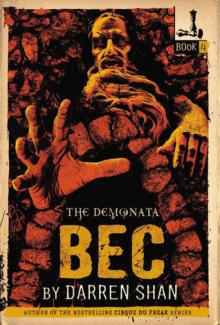 Slawter
Slawter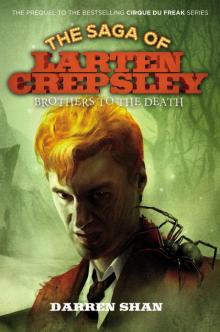 Brothers to the Death
Brothers to the Death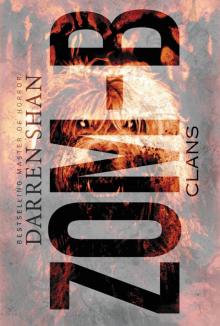 Zom-B Clans
Zom-B Clans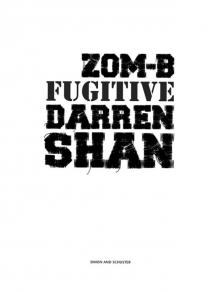 Zom-B Fugitive
Zom-B Fugitive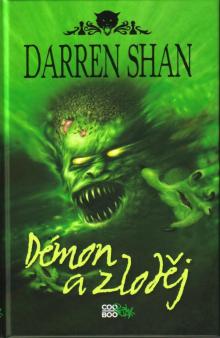 Demon Thief
Demon Thief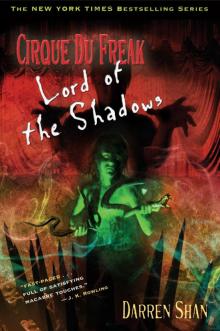 Lord of the Shadows
Lord of the Shadows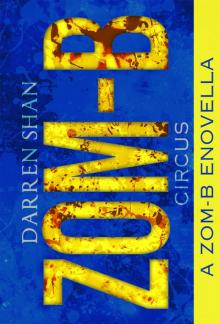 Zom-B Circus
Zom-B Circus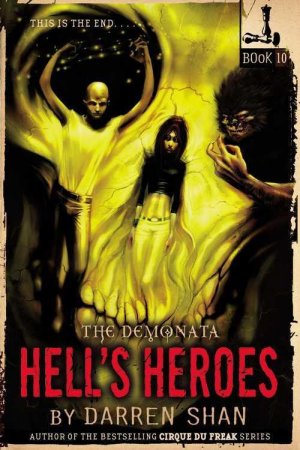 Hell's Heroes
Hell's Heroes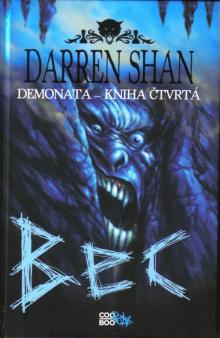 Bec
Bec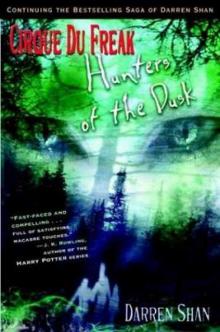 Hunters of the Dusk
Hunters of the Dusk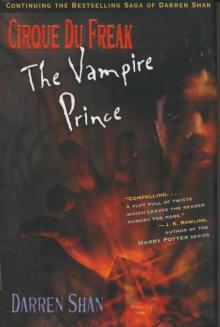 The Vampire Prince
The Vampire Prince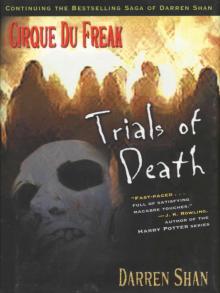 Trials of Death
Trials of Death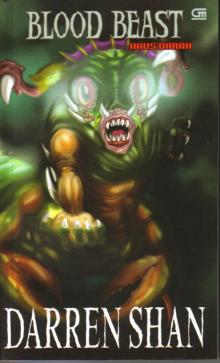 Blood Beast
Blood Beast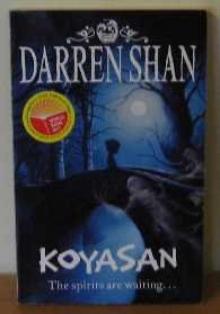 Koyasan
Koyasan Zom-B Goddess
Zom-B Goddess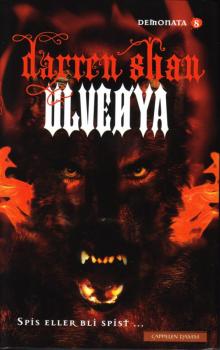 Wolf Island
Wolf Island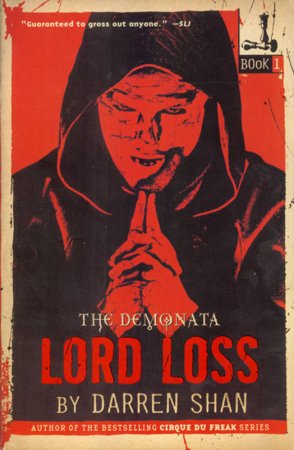 Lord Loss
Lord Loss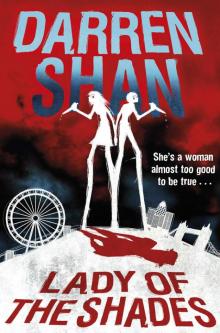 Lady of the Shades
Lady of the Shades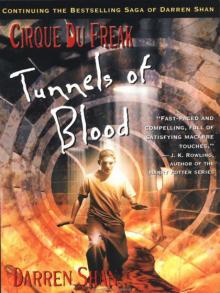 Tunnels of Blood
Tunnels of Blood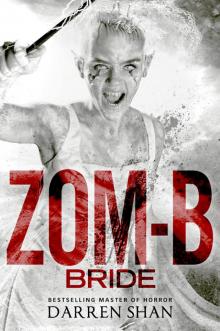 Zom-B Bride
Zom-B Bride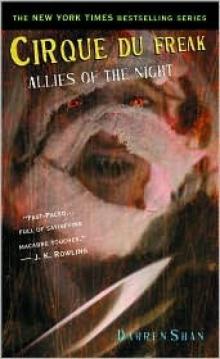 Allies of the Night
Allies of the Night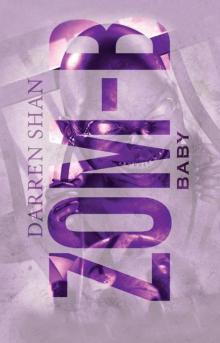 Zom-B Baby
Zom-B Baby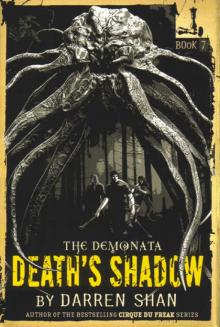 Deaths Shadow
Deaths Shadow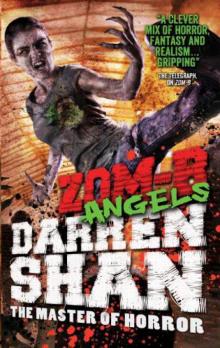 Zom-B Angels
Zom-B Angels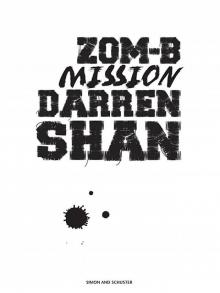 Zom-B Mission
Zom-B Mission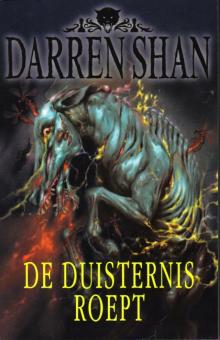 Dark Calling
Dark Calling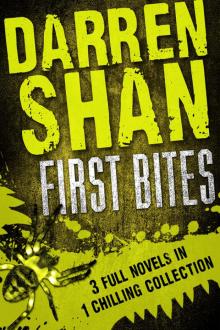 First Bites
First Bites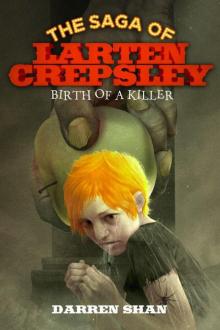 Birth of a Killer
Birth of a Killer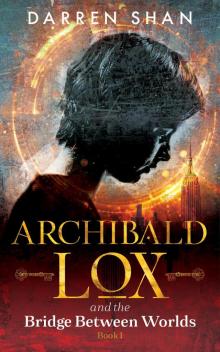 Archibald Lox and the Bridge Between Worlds
Archibald Lox and the Bridge Between Worlds Archibald Lox and the Vote of Alignment
Archibald Lox and the Vote of Alignment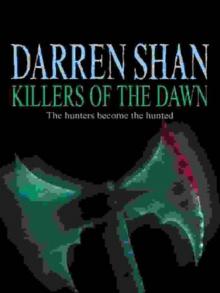 Killers of the Dawn
Killers of the Dawn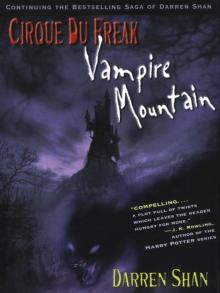 Vampire Mountain
Vampire Mountain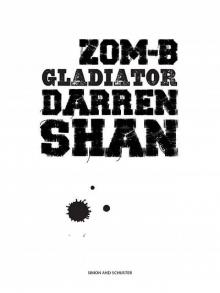 Zom-B Gladiator
Zom-B Gladiator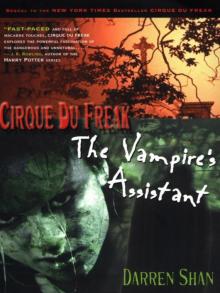 The Vampire's Assistant
The Vampire's Assistant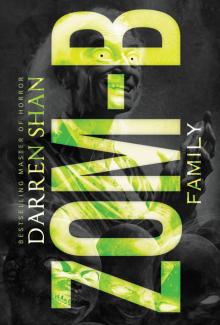 Zom-B Family
Zom-B Family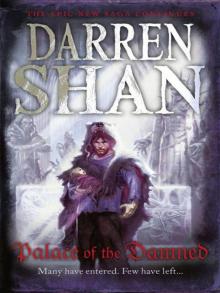 Palace of the Damned
Palace of the Damned A Living Nightmare
A Living Nightmare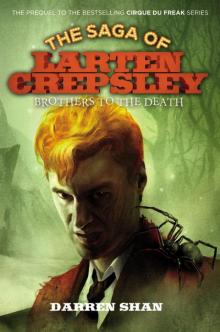 Brothers to the Death (The Saga of Larten Crepsley)
Brothers to the Death (The Saga of Larten Crepsley)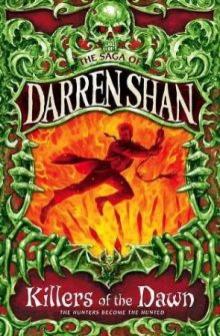 Killers Of The Dawn tsods-9
Killers Of The Dawn tsods-9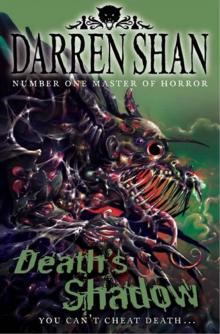 Death's Shadow td-7
Death's Shadow td-7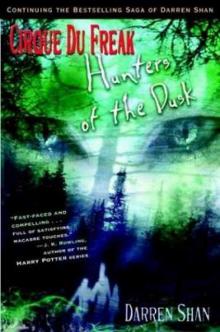 CIRQUE DU FREAK 7 - Hunters of the Dusk
CIRQUE DU FREAK 7 - Hunters of the Dusk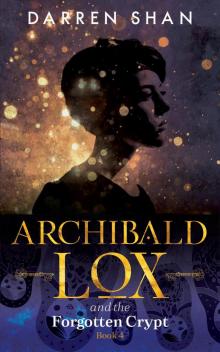 Archibald Lox and the Forgotten Crypt
Archibald Lox and the Forgotten Crypt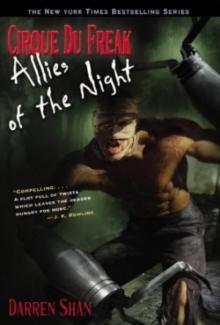 Allies Of The Night tsods-8
Allies Of The Night tsods-8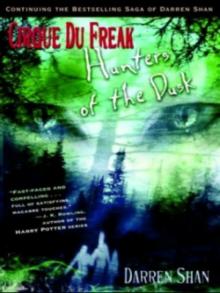 Hunters Of The Dusk tsods-7
Hunters Of The Dusk tsods-7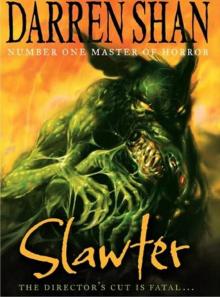 Slawter td-3
Slawter td-3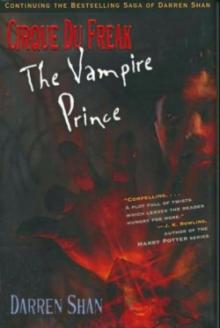 Vampire Prince tsods-6
Vampire Prince tsods-6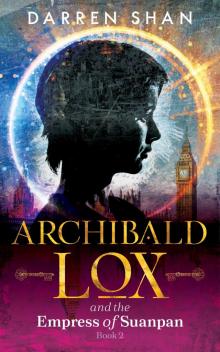 Archibald Lox and the Empress of Suanpan
Archibald Lox and the Empress of Suanpan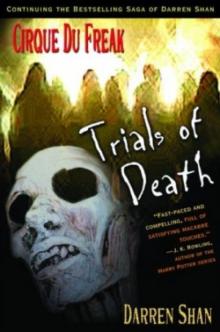 Trials Of Death tsods-5
Trials Of Death tsods-5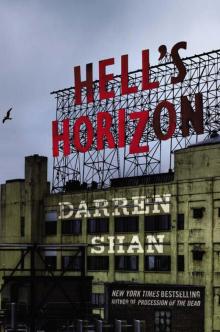 Hell's Horizon tct-2
Hell's Horizon tct-2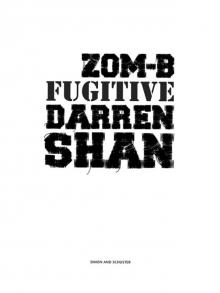 ZOM-B 11
ZOM-B 11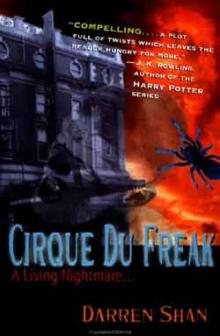 Cirque Du Freak - Book 1
Cirque Du Freak - Book 1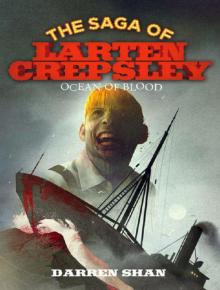 02 Ocean of Blood tsolc-2
02 Ocean of Blood tsolc-2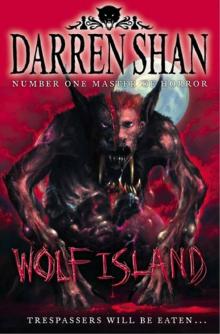 Wolf Island td-8
Wolf Island td-8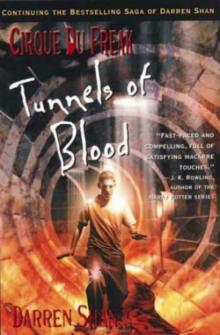 Tunnels of Blood tsods-3
Tunnels of Blood tsods-3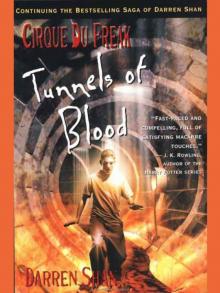 Cirque du Freak 3 - Tunnels of Blood
Cirque du Freak 3 - Tunnels of Blood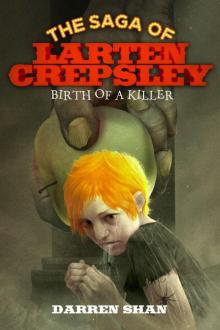 01 Birth of a Killer
01 Birth of a Killer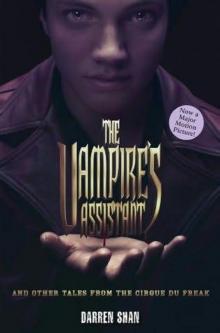 The Vampire's Assistant and Other Tales from the Cirque Du Freak
The Vampire's Assistant and Other Tales from the Cirque Du Freak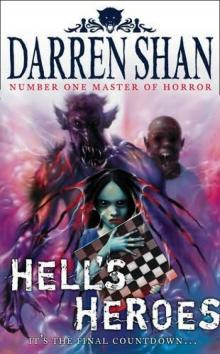 Hell's Heroes td-10
Hell's Heroes td-10 Zom-B #12
Zom-B #12![[Cirque du Freak 11] - Lord of the Shadows Read online](http://i1.bookreadfree.com/i1/03/31/cirque_du_freak_11_-_lord_of_the_shadows_preview.jpg) [Cirque du Freak 11] - Lord of the Shadows
[Cirque du Freak 11] - Lord of the Shadows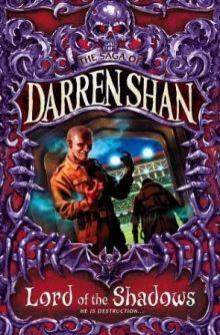 Lord Of The Shadows tsods-10
Lord Of The Shadows tsods-10 Demon Apocalypse td-6
Demon Apocalypse td-6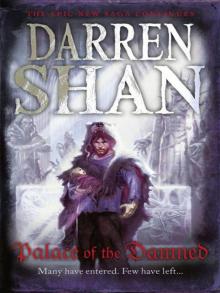 The Saga of Larten Crepsley (3) – Palace of the Damned
The Saga of Larten Crepsley (3) – Palace of the Damned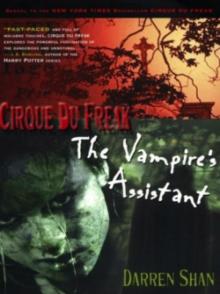 The Vampire's Assistant tsods-2
The Vampire's Assistant tsods-2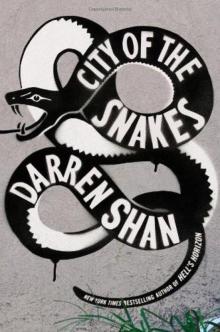 City of the Snakes tct-3
City of the Snakes tct-3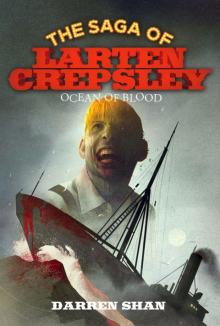 02 Ocean of Blood
02 Ocean of Blood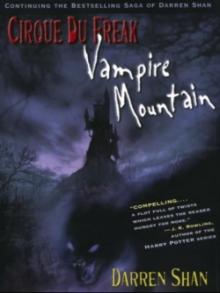 Vampire Mountain tsods-4
Vampire Mountain tsods-4 The Lake Of Souls tsods-11
The Lake Of Souls tsods-11 Lord Loss td-1
Lord Loss td-1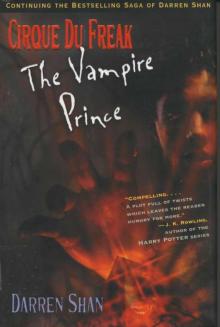 Cirque Du Freak Book 6 - Vampire Prince
Cirque Du Freak Book 6 - Vampire Prince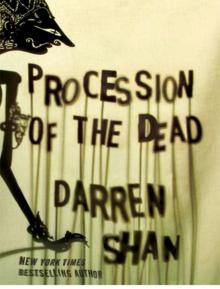 Procession of the dead tct-2
Procession of the dead tct-2 Vampire Prince
Vampire Prince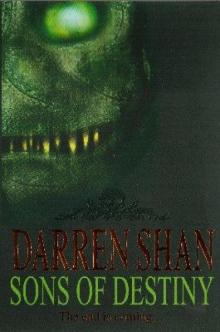 Sons Of Destiny tsods-12
Sons Of Destiny tsods-12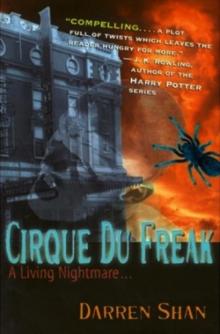 Cirque Du Freak tsods-1
Cirque Du Freak tsods-1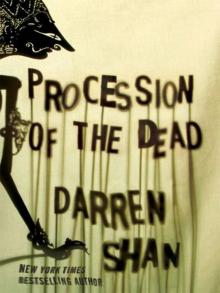 Procession of the Dead
Procession of the Dead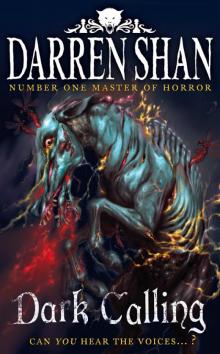 Dark Calling td-9
Dark Calling td-9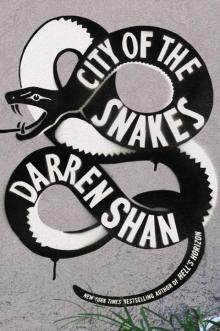 03 City of the Snakes
03 City of the Snakes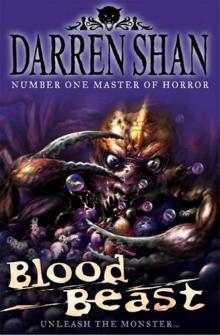 Blood Beast td-5
Blood Beast td-5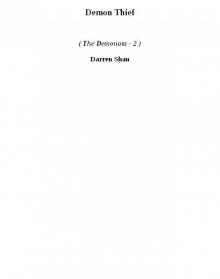 Demon Thief td-2
Demon Thief td-2